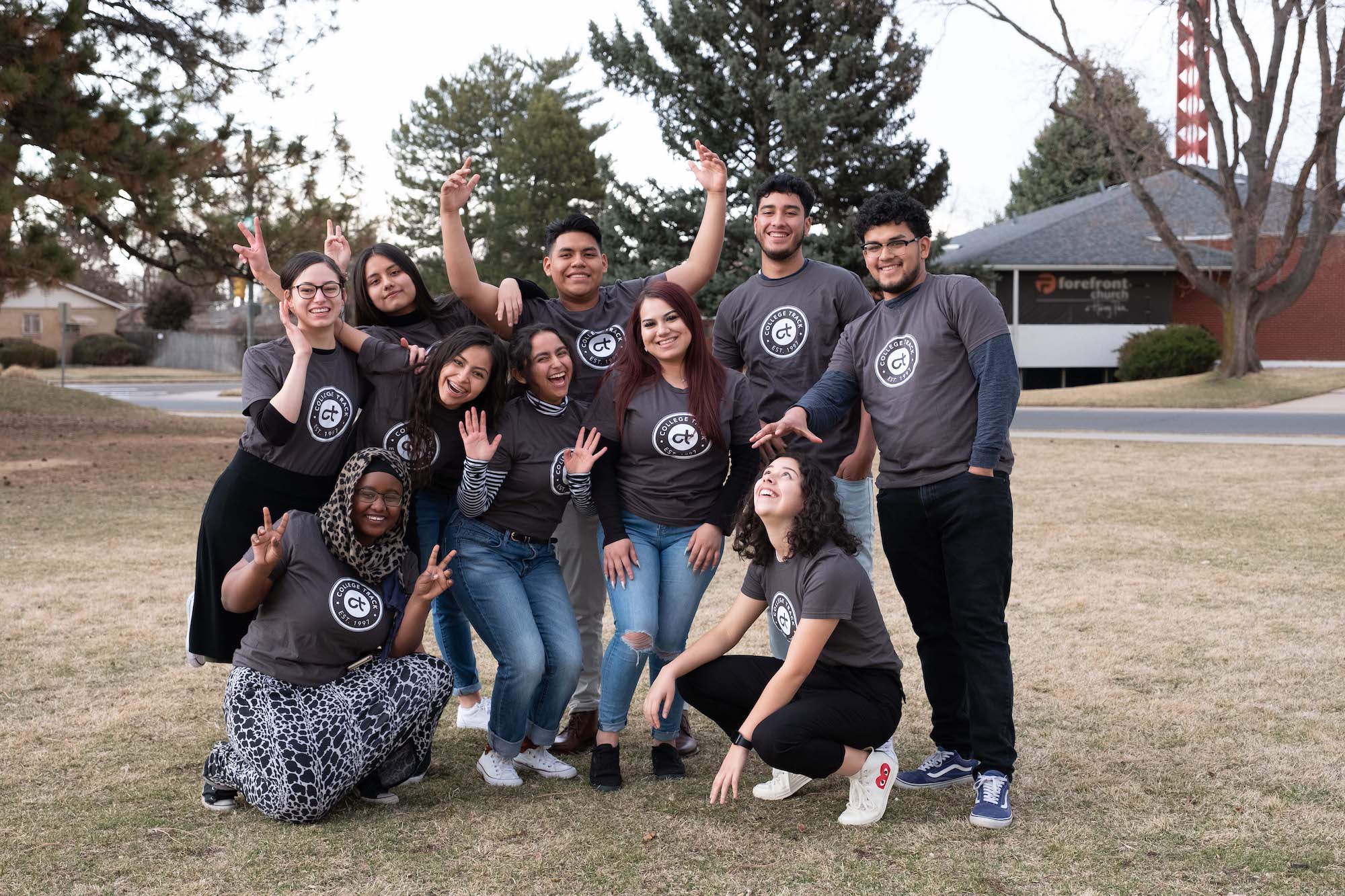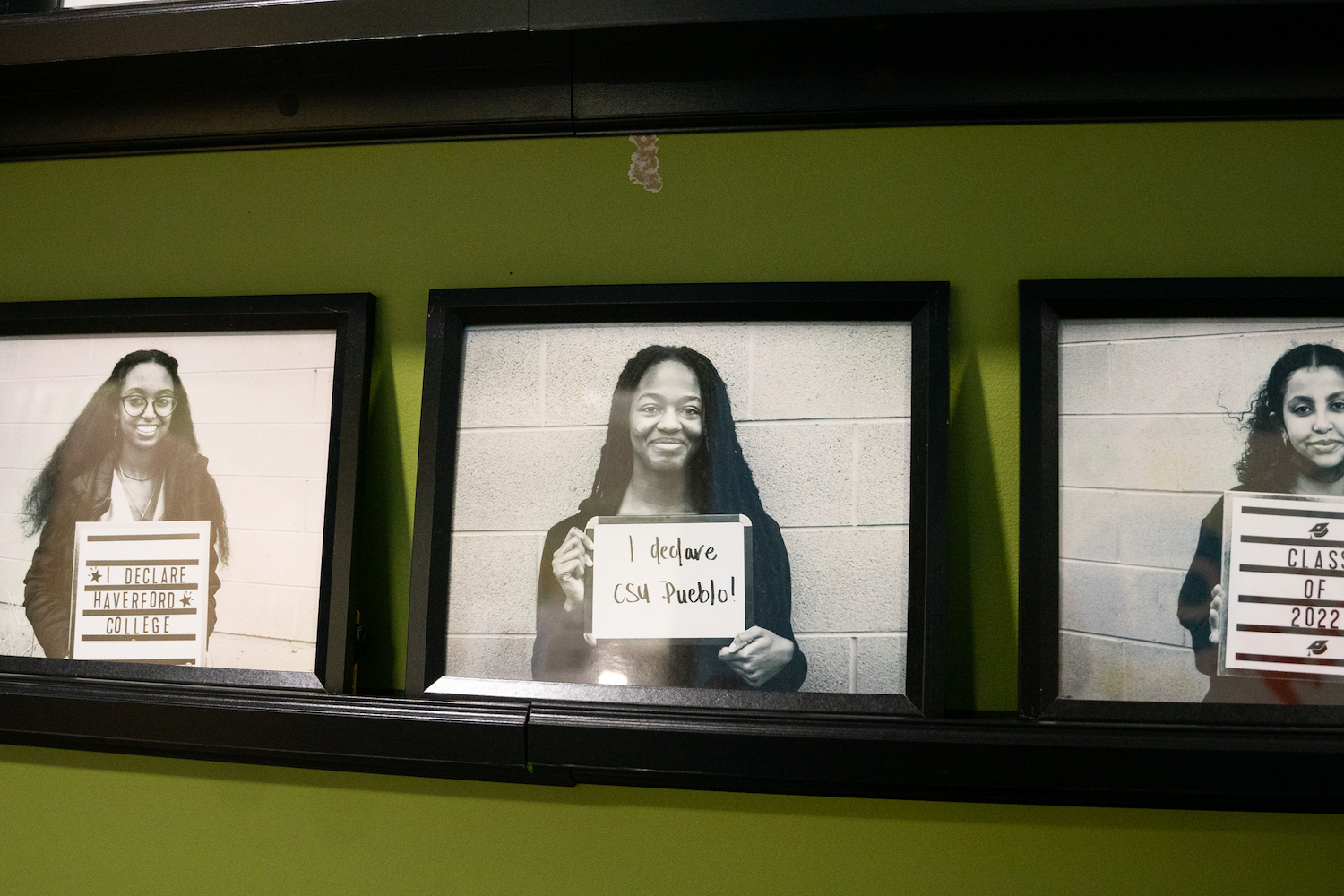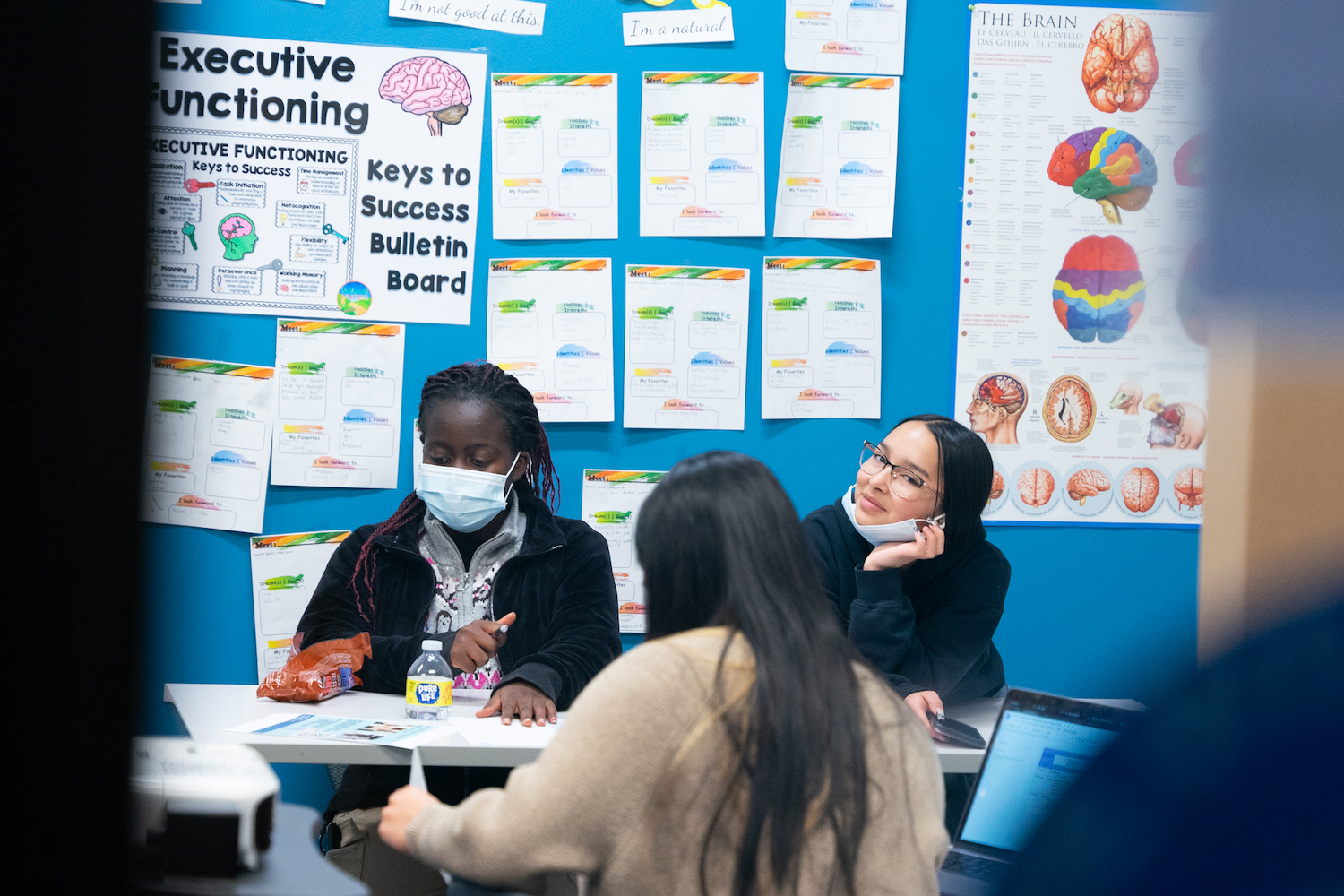
Students from College Track’s Denver center gather outside the current location south of downtown.
Preparing for a college fair in September, Alliyah Mejia Hernandez, an 11th grader at Aurora’s Rangeview High School, came up with questions for the admissions counselors she would meet there.
Can you talk about financial aid and scholarship opportunities?
How does diversity look on your campus?
What options are there for study abroad?
Weeks later, she could remember many responses, and she had a better sense of the colleges she was considering. Equally important was the feeling she had after leaving the event. No one in her family had a college degree, and yet she had been there, at the Denver Coliseum, navigating the room and gathering information. She’d had a new experience, adding to a framework of college preparation and confidence she started building in 9th grade at the outset of a decade-long program offered by College Track.
“It’s much more than a college prep program,” Hernandez said of the national nonprofit. “Every year is about taking these baby steps. One of the biggest things for me is the community. They create such a safe space.”
College Track, based in Oakland, California, currently works with Hernandez and about 250 other Colorado high school students, most of them aspiring first-generation college graduates, at centers it operates in Aurora and Denver. Now, the organization’s work in the state is poised to expand significantly under a new, multi-dimensional partnership involving College Track and the Colorado State University System.
The wide-ranging partnership, announced Dec. 1 at a meeting of the CSU System Board of Governors, will relocate College Track’s Denver center to the CSU Spur campus in north Denver while creating a pathway for at least 25 College Track students each year to pursue bachelor’s degrees at one of the CSU System campuses: CSU, CSU Pueblo, and CSU Global.
CSU System Chancellor Tony Frank said the agreement between the two organizations reflects both shared values and complementary strengths.
“This partnership establishes a new model for supporting students and introducing them to a range of academic and career possibilities,” Frank said. “The three campuses in the CSU System share with College Track a deep commitment to increasing access and opportunity for students, regardless of their backgrounds. The work we will be doing together will lead to significant benefits, both in the lives of students and their families, and in the strength of our communities.”


Left: Portraits at College Track’s Aurora center track the college plans of students who’ve moved on to the college and career phases of the program. Right: High school students in College Track’s program complete a sequence of courses on topics that include academic affairs, college access, student life, and wellness.
The partnership is College Track’s first with a university system, and it will establish a center that will be the organization’s first to be located on a college campus. College Track will have access to a common area, offices, conference rooms, and other workspace inside The Shop, a structure built in 1930 that is being renovated as part of the CSU Spur campus. The program will utilize classrooms inside the connected Hydro building, which opens Jan. 6 and is the third and final building making up the CSU Spur campus. Students will be able to connect to a broad range of research and educational activities that are an essential part of efforts at the Spur campus to engage and inform the public about challenges facing society and ways they might become involved in addressing them.
College Track’s current center in Denver, which opened in 2016 and is located south of downtown, began the fall semester with about 50 students and expects to have 80 enrolled by January. The site director, Deborah Van Roy, said ongoing recruiting efforts should bring the total to more than 100 students by the time fall programming begins at CSU Spur. Those students, largely from high schools in south Denver, will stay in the program even as recruiting expands to communities closer to the site, including Northeast Park Hill, Cole, Five Points, Globeville, and Elyria-Swansea. The plan is to grow over time to about 250 participants at the new center.
Visits to Spur that have already occurred hint at possibilities the move will present, Van Roy said. Part of College Track’s approach involves “meaningful summer experiences” that introduce students to potential life and career paths. This past summer, the Denver and Aurora sites combined efforts to explore agriculture and environmental topics at Spur’s Terra building.
In the spring, a group from the Denver center visited the Vida building at CSU Spur, including stops at the Temple Grandin Equine Center and a virtual reality classroom that allows students to explore animal anatomy. Van Roy said the visit had an impact on at least two scholars, reaffirming one student’s interest in becoming a vet and introducing another to the use of horses and other animals in various types of therapy.
Exposing students to potential academic and career paths is one important part of College Track’s model. Another is providing focused, long-term support, from the beginning of high school, through college, and into careers. The nonprofit operates 12 centers across the country that serve as neighborhood hubs for supporting thousands of students, most of whom will become the first members of their families to complete bachelor’s degrees.
Shirley M. Collado, College Track’s president and CEO and president emerita of Ithaca College, said the organization is guided by the goal of “democratizing potential.”
“Talent is everywhere, but opportunity is not evenly distributed,” Collado said. “For us, the model for democratizing potential is that you can’t just give first generation students from underserved communities an opportunity. It also needs to be coupled with choice and with power.”

Alliyah Mejia Hernandez says College Track provides a sense of community while also breaking the process of preparing for college into “baby steps.”
On average, adults with bachelor’s degrees earn $1.2 million more over their lifetimes than those whose education stopped at the high school level, according to data compiled by the Association of Public and Land Grant Universities. College graduates are also more likely to hold jobs, have health insurance, and engage in civic life by voting, volunteering, and making charitable contributions.
These benefits may seem remote for many students raised in families without a history of college completion. According to a 2021 survey conducted by the Pew Research Center, 82% of adults who had two parents with at least a bachelor’s degree held bachelor’s degrees themselves, compared to 20% of those who had no parent with college experience.
The goals of empowering students and introducing them to possible choices are evident in both the environment College Track creates and the details of the program it offers to participants. At the center in Aurora, the walls are festooned with college pennants and posters listing “keys to success” or reminders of financial aid application deadlines. Shelves are filled with portraits of participants who’ve moved on to the college or career phases of the program. Each holds a whiteboard with their class year or the message, “I declare” followed by an institution: CSU Pueblo, CU Denver, NYU.
The program for high school students revolves around sequenced “courses” for each grade focused on topics ranging from study skills and test preparation to strategies for stress management and maintaining wellness. The Aurora center currently serves 170 high school students and will be adding up to 70 new 9th graders in the spring. Students generally visit the center once or twice each week for late afternoon sessions broken into periods.
On a Tuesday in November, a group gathered for a first-period wellness session focused on reducing stress through movement, including the use of Rhumba moves. In another classroom, students focused on college access worked with a staff member on financial aid forms. Across the hall, students critiqued college admission essays and then brainstormed their own responses to prompts from the Common Application about meaningful experiences in their own lives.
Kyanna Moreno Ocampo, a 10th grade student at Rangeview High School, said she appreciates the way the program is helping her think about how to afford college, and also the way she has been encouraged to think about directions she might take after getting a degree.
“I just really enjoy helping other people,” she said, explaining she was drawn to the idea of becoming a pediatrician. Now she is aware of other careers that involve helping people, and she is also thinking about the possibility of becoming a therapist or child social worker.
While participating in the program adds to an already busy schedule, Ocampo described the center, which is located in an Aurora shopping center, as a refuge where she can set aside, for a time, competing responsibilities, including the need to watch out for younger siblings. Unlike school, where she is one of many students in each class, the center is a place where staff members are “involved in our lives,” she said.
For Hernandez, the “baby steps” involved in thinking about and preparing for college are part of the program’s appeal. She said she also benefits from the focus on wellness and advice for managing stress, including the need to pay attention to her breathing. Other experiences, including opportunities to explore careers, and even an end-of-year party and a scavenger hunt, have all helped to build a sense of community. The combined effect, she said, sends a powerful message: “I’m not alone in this journey.”
About the Colorado State University System and CSU Spur
CSU Spur is a new, free educational year-round public life-long learning destination in Denver focused on engaging PreK-12 students, families, and visitors around food, water, and health. CSU Spur showcases the work of the CSU System campuses: CSU, CSU Pueblo, and CSU Global, and offers degree programs that originate from the campus offerings. Spur is built upon the land-grant mission of access to education and the belief that students can be anything they want to be. To inspire learners of all ages to engage in important world issues, CSU Spur brings together scientists to collaborate, puts science on-display, and showcases career paths. The CSU Spur campus provides immersive learning experiences and cutting-edge research across three buildings: Vida, Terra, and Hydro. Learn more at CSUSpur.org.
About College Track
College Track’s mission is to democratize potential by equipping students confronting systemic barriers to earn a bachelor’s degree in pursuit of a life of opportunity, choice, and power. College Track serves nearly 3,500 students in 12 centers located in California, Colorado, Louisiana, and the D.C. Metro Area, with more than 1,100 alumni across America. Ninety percent of College Track scholars are first-generation college students, and 84 percent are from underserved communities. They earn their bachelor’s degrees at more than two and a half times the rate of their first-generation peers.